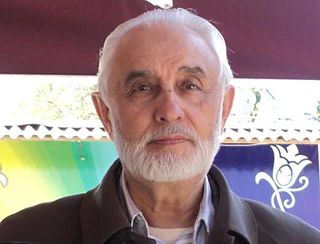
Translations of the Qurʻan are considered interpretations of the scripture of Islam in languages other than Arabic. The Qurʻan was originally written in the Arabic language and has been translated into most major African, Asian and European languages.
Dhu al-Kifl is an Islamic prophet. Although his identity is unknown, his identity has been theorised and identified as various Hebrew Bible prophets and other figures, most commonly Ezekiel. Dhu al-Kifl is believed to have been exalted by Allah to a high station in life and is chronicled in the Quran as a man of the "Company of the Good". Although not much is known of Dhu al-Kifl from other historical sources, all the writings from classical commentators, such as Ibn Ishaq and Ibn Kathir, speak of Dhu al-Kifl as a prophetic, saintly man who remained faithful in daily prayer and worship.

The Kneeling, is the 45th chapter (surah) of the Qur'an with 37 verses (ayat). It is a Meccan chapter, believed revealed according to the Islamic tradition during the Meccan phase of Muhammad's prophethood. This is one of the seven chapters in the Qur'an that start with the Muqattaʿat Hāʼ Mīm. It contains discussions of "signs of God" for humankind to reflect on, and describes punishments for those who deny God despite the signs. It also contains the only Quranic verse mentioning sharia, a term which Muslims later use to refer to the Islamic law.

Ar-Rahman is the 55th Chapter (Surah) of the Qur'an, with 78 verses (āyāt).

Al-Waqi'a is the 56th surah (chapter) of the Quran. Muslims believe it was revealed in Mecca, specifically around 7 years before the Hijrah (622), the migration of Muhammad to Medina. The total number of verses in this surah is 96. It mainly discusses the afterlife according to Islam, and the different fates people will face in it.

"Divorce" is the 65th chapter of the Qur'an with 12 verses (ayat). At-Talaq is not only the name of this Surah but also the title of its subject matter, as it contains commandments about Talaq (divorce) itself. Abdullah ibn Masud reportedly described it as the shorter surah An-Nisa. The surah also defines the time period of mourning (iddah) to be three menstruation periods. For pre-menarche girls and for post-menopause women - three months. In case of pregnancy, after the delivery of the child.

The Holy Qur'an: Text, Translation and Commentary is an English translation of the Qur'an by the British Indian Abdullah Yusuf Ali (1872–1953) during the British Raj. It has become among the most widely known English translations of the Qur'an, due in part to its prodigious use of footnotes, and its distribution and subsidization by Saudi Arabian beneficiaries during the late 20th century.
Following is a list of English translations of the Quran. The first translations were created in the 17th and 19th centuries by non-Muslims, but the majority of existing translations have been produced in the 20th and 21st centuries.

The Noble Qur'an is a translation of the Quran by Muhammad Muhsin Khan and Muhammad Taqi-ud-Din al-Hilali. It is available in many languages and is "widely and freely distributed to hajj pilgrims". It is published and printed at the King Fahd Complex for the Printing of the Holy Quran, which is said to produce ten million copies of the Quran every year.

God in Islam is seen as the eternal creator and sustainer of the universe, who will eventually resurrect all humans. In Islam, God is conceived as a perfect, singular, immortal, omnipotent, and omniscient god, completely infinite in all of his attributes. Islam further emphasizes that God is most-merciful.

Süleyman Hilmi Tunahan,, was a 20th-century Islamic scholar born in the small Ottoman village of Ferhatlar, also known as Varatlar and today Delchevo in the Razgrad Province, Bulgaria. Süleyman later became a Sufi Master in the tradition of the Naqshbandi Order.

The 1906–07 season was Galatasaray SK's 3rd in existence and the club's 1st in the Istanbul Football League.
Ma'ariful Qur'an is an eight-volume tafsir (exegesis) of the Quran written by Islamic scholar Mufti Muhammad Shafi (1897–1976). Originally written in Urdu, it is the most prominent work of its author.

The Holy Quran with English translation and commentary is a 5 volume commentary of the Quran published in 1963 by the Ahmadiyya Muslim Community. It was prepared by a board of translators consisting of Maulvi Sher Ali, Mirza Bashir Ahmad and Malik Ghulam Farid.

Ta'wilat Ahl al-Sunnah or Ta'wilat al-Qur'an, better known as Tafsir al-Maturidi, is a classical Sunni tafsir, written by the Hanafi scholar Abu Mansur al-Maturidi, who was a contemporary of al-Tabari.

The Qur'an with Annotated Interpretation in Modern English is an English translation of the meanings of Qur'an written by Turkish Sunni Muslim scholar Ali Ünal. First published in 2006.

Nurettin Uzunoğlu was a Turkish Qur'an translator and commentator, writer, missionary, political scientist, academic, and professor who worked as a lecturer at various universities in the USA and has the title of "Turkey's second youngest professor" at the age of 27. He spoke nine foreign languages, including English, German, French, Arabic, Japanese, Urdu, and Malay; and became fluent in English at a young age.














